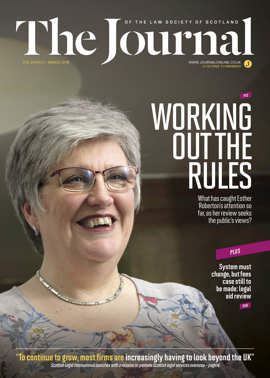This time it's personal

Our highest priority as lawyers is to be thought of as professional. Today’s social media-driven world judges our private and business lives ruthlessly, with poor prospects of redemption for shortcomings real or confected. A reputation built painstakingly over decades may be vaporised faster than snow in a furnace by an unwise tweet.
This is one compelling reason why there are so few characters left in the law. The culture of larger firms in particular discourages personality. There are distinguished exceptions, but generally, as they grow, controls come in the door and individuality goes out the window. Add in lawyers’ instinctive distaste for self-promotion, something which deep inside most of us think is vulgar and unnecessary. Our work should speak for itself. We are virtuosos on the unblown trumpet.
Up to a point, these feelings are understandable. Clients, timid creatures that they are, tend not to gravitate towards advisers whose persona reminds them of Bob Geldof on a big night out. But the consequence of excessive professional reserve is that much of what is most attractive and interesting about us remains hidden. Our clients know us for what we do, not for who we are. This short-changes both of us. Humans crave relationships – a feeling of connection with others. And we want narrative too, stories about the people we know that give us insight into what makes them tick. In an age where legal services are bought so much by analysis and process – teams of procurement professionals doing their best to make bloodless choices between one firm and another – it is remarkable how many decisions are still strongly influenced by emotion.
Subliminally at least, most clients are asking: “These guys are probably competent, but how much do I like and trust them?” We cannot like and trust people unless we feel we know them, and the lesson of all this is that the road to valuable relationships, professional and personal, starts with being unafraid to open a window into our lives.
Hidden talent
It is not necessary to become a walking version of the Jeremy Kyle Show. What populates your hinterland? One of the greatest pleasures of my life is being constantly surprised by the “secret” accomplishments of the clients I work with: rock guitarists (not just the air variety), artists, experts in ghost stories, extreme sport, jazz, blues and classical music, languages, Stephen Sondheim, military history and many more. Smart, curious people having private passions is not a surprise, but it is more surprising that they keep them so tightly under wraps, when they are among the best things about them.
Of course, interest in hinterland needs to cut both ways. There is hardly a law firm in the land that does not have emblazoned on its marketing materials solemn declarations of how deeply it knows its clients’ business, to which the most realistic response is that of the sage and philosopher Kenneth Mathieson Dalglish: “Mebbes Aye. Mebbes Naw.”
Rarely do you see similar claims of how interested firms are in their clients as individuals. There is a line, and with good reason we worry about crossing it. But there is a big difference between prying and taking a generous, open-hearted interest.
The personal touch
Law firms fret constantly about how they can differentiate themselves from the competition. Here is an easy win. We are all our own favourite subject. “Get personal” in the best possible sense, by engaging with clients as flesh and blood human beings, who have hopes, dreams, passions, families and histories, not as mere sources of revenue. At the same time be willing to share appropriately something of yourself, especially where you find you have things in common. In this openness lies the key to building a strong, attractive personal brand, and relationships characterised by lasting warmth, not just professional respect.
For those who are still doubtful about blurring the line between the personal and professional, there are interesting lessons from LinkedIn. It aspires to be a forum devoted entirely to business, but posts which share personal experience regularly attract thousands of hits. They are no substitute for posts demonstrating expertise, but they are not trying to be. They fill out the picture and done well, draw people in.
Above all, be authentic. Richard Branson once remarked that: “Too many businesses want to reflect some idealised, perfected image of themselves. As a consequence, their brands acquire no texture, no character and no public trust.” As usual, Oscar Wilde put it best: “Be yourself. Everyone else is taken.”
In this issue
- Borrowings, partner capital and profitability
- GDPR and the cloud
- Employment claims: is the flood still to come?
- Contributory fault: drivers, cyclists and pedestrians
- Reading for pleasure
- Opinion: Derek McCabe
- Book reviews
- Profile: Siobhan Kahmann
- President's column
- Application changes coming
- People on the move
- Seeking a better way
- Beyond borders
- Drawings and profitability
- Enforceable rights or progressive policy goals?
- Conflict theory: it works
- What the liquidators don't tell you
- The office on the move
- Please can we have some more?
- Health check for doctors' lines
- When creditors come first
- Keeping goods exclusive
- Tenant Farming Commissioner: the story so far
- HSE appeals: experts allowed in
- Scottish Solicitors' Discipline Tribunal
- Please don't stop the music
- Broadcasting's business end
- Public policy highlights
- Scam warnings escalate
- This time it's personal
- The game's not a bogey!
- "Only amateurs attack machines; professionals target people"
- When estate agents need client ID
- Banks, client accounts and the Money Laundering Regulations
- Third party rights: what now?
- Ask Ash






